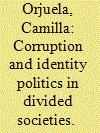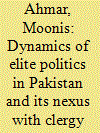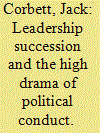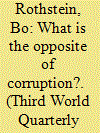|
|
|
Sort Order |
|
|
|
Items / Page
|
|
|
|
|
|
|
| Srl | Item |
| 1 |
ID:
136675


|
|
|
|
|
| Summary/Abstract |
The 2014 general elections in India saw an increase of over a hundred million eligible voters as compared to 2009. This paper analyses the chord struck by the Narendra Modi-led Bharatiya Janata Party (BJP) with first-time voters. A survey in the Pilibhit district of Uttar Pradesh revealed that young voters, contrary to historical trends in the state did not consider caste or religious affiliations to be of substantive importance. Instead, they gave precedence to issues of corruption and development indicating a paradigm shift in thinking and a willingness to move beyond social divides and focus on economic concerns. The BJP emerged as the most popular party among participants as they felt it promised corruption-free developmental governance.
|
|
|
|
|
|
|
|
|
|
|
|
|
|
|
|
| 2 |
ID:
135390


|
|
|
|
|
| Summary/Abstract |
Corruption is an extremely serious social problem in China today. As Xi Jinping said during a collective studies session at the Political Bureau on November 17, 2012, “lfthe corruption problem keeps going from bad to worse, it is bound to eventually bring down the Party and the country." Speaking at a meeting ofthe Ministry ofSupervision ofthe Central Coin- mission for Discipline Inspection on November 19, 2012, secretary of the CPC Central Commission for Discipline Inspection, Wang Qishan, also emphasized “unswerving opposition to corruption.”
|
|
|
|
|
|
|
|
|
|
|
|
|
|
|
|
| 3 |
ID:
134287


|
|
|
|
|
| Publication |
2014.
|
| Summary/Abstract |
Corruption is a major problem for populations in various parts of the world. This article argues that to understand the problems and dynamics of corruption, we need to understand how discourses and practices of corruption (and anti-corruption efforts) are intertwined with the construction and contestations of identity. Identity politics is a salient feature in peaceful political struggles, as well as in contemporary armed conflicts, which are often characterised by the politicisation of collective identity (ethnic, national, religious) for the violent pursuit of power. The article outlines and discusses four ways in which identity politics and corruption intersect. First, it points to the often blurred lines between private and collective benefit from corruption, revealing the implications of group identity for how corruption is conceptualised. Second, it shows how corruption may exacerbate grievances along identity lines. Third, it highlights how corruption can be used strategically in identity-based conflicts. Finally, it explores how corruption may encourage cross-ethnic solidarity and mobilisation that defy conflict divides.
|
|
|
|
|
|
|
|
|
|
|
|
|
|
|
|
| 4 |
ID:
134285


|
|
|
|
|
| Summary/Abstract |
Corruption in the aftermath of war’ brings together an interdisciplinary group of scholars to enquire into the dynamics of corruption in post-conflict societies. This introduction discusses five themes, problematising and summarising key findings from the 10 articles included. First, we discuss the problems with the corruption concept, related to its moralising connotations and definitional vagueness, and propose viewing corruption as a collective action dilemma as a way of avoiding these moralising aspects. Second, we discuss post-conflict societies, and highlight the great varieties of ‘peace’ that that label can refer to. We suggest that the causes, dynamics and effects of corruption in post-conflict societies bear many similarities with those in other societies, but that the post-conflict situation often generates an intensification and entrenchment of corruption-related problems. Third, we analyse the dynamics between international interveners and domestic actors, and show the contradictions and tensions in international–domestic relations. Fourth, we argue that the inter-linkages between inequality, mistrust and corruption deserve consideration in the study of post-conflict societies, and that inequality in particular merits more attention. Finally, we discuss some methodological challenges encountered by the contributors in their studies of corruption in post-conflict societies.
|
|
|
|
|
|
|
|
|
|
|
|
|
|
|
|
| 5 |
ID:
136303


|
|
|
|
|
| Summary/Abstract |
Elite politics in Pakistan is focused on ensuring the privileged status of those classes who hold considerable influence in society. Conformist elite since the creation of Pakistan until today pursue a status quo oriented approach. Non-conformist elite is a recent phenomenon with a purpose to bring qualitative change in society, to dismantle the exploitive order, weed out corruption, and pull Pakistan from decades of stagnation and underdevelopment.
|
|
|
|
|
|
|
|
|
|
|
|
|
|
|
|
| 6 |
ID:
135115


|
|
|
|
|
| Summary/Abstract |
Politicians in the Pacific Islands are regularly accused of corruption and yet, paradoxically, they also tend to be the most vocal public commentators when incidents of misconduct arise, with accusation and counter-accusation all part of the political theatre. Given their central role in these debates, we ask how politicians interpret political conduct. Based on interviews and public comments, we explore the meanings and beliefs that politicians in Samoa ascribe to three interrelated cases where the actions of their colleagues are under scrutiny. We find a series of divergent and conflicting views. We add to the literature on corruption, both in the Pacific and more generally, by showing how questions about conduct not only vary according to context but are invariably rooted in the cut and thrust of everyday politics, which in this case is dominated by the question of leadership succession.
|
|
|
|
|
|
|
|
|
|
|
|
|
|
|
|
| 7 |
ID:
136685


|
|
|
|
|
| Summary/Abstract |
In a nail-biting election on January 8 2015, the Sri Lankan public voted out of power its president of two decades who was credited with smashing the Tamil Tigers.
There were many firsts for Sri Lanka in this election: it was the first time an incumbent president had sought a third term; it was the first time a rainbow coalition of political forces ranging from the far-Right to the extreme-Left ran against him; and it was the first time Sri Lankans voted against corruption and for better governance. At the heart of this change was the desire for democracy and a change from the dynastic authoritarianism of Mahinda Rajapakse
|
|
|
|
|
|
|
|
|
|
|
|
|
|
|
|
| 8 |
ID:
134286


|
|
|
|
|
| Publication |
2014.
|
| Summary/Abstract |
Corruption has turned out to be difficult to define and what should be counted as the opposite to corruption remains widely disputed. If the goal for a post-conflict society is not only to become democratic and prevent a return to violence but also to reduce systemic corruption, we need to know what it is that should be fought and how the opposite to systemic corruption should be conceptualised. To define the opposite to corruption, choices have to be made along four conceptual dimensions. These are universalism vs relativism, uni- vs multidimensionality, normative vs empirical and whether the definition should relate to political procedures or policy substance. As a result of this conceptual analysis, it is argued, a universal, one-dimensional, normative and procedural definition should be preferred. The suggested definition is that of impartiality as the basic norm for the implementation of laws and policies. This conceptual analysis ends with a discussion of why such a norm has historically and in the contemporary world been hard to achieve and why it is especially problematic in post-conflict societies.
|
|
|
|
|
|
|
|
|
|
|
|
|
|
|
|
|
|
|
|
|